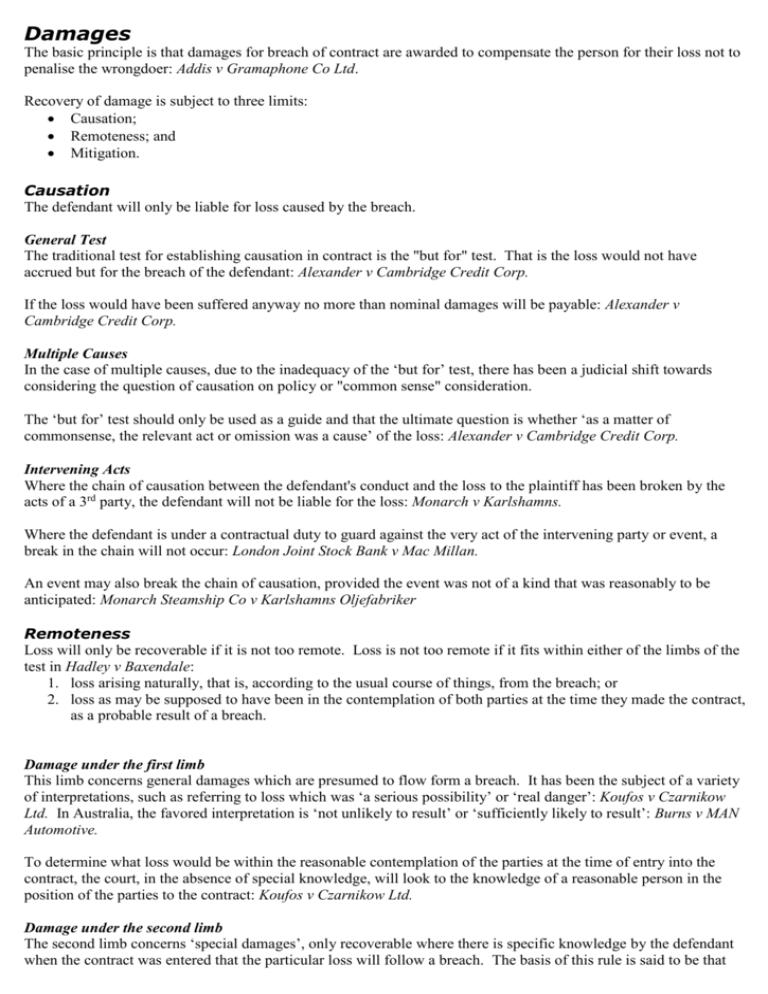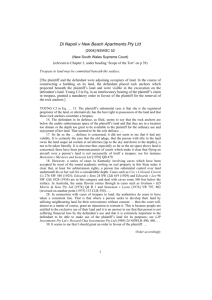Damages
advertisement

Damages The basic principle is that damages for breach of contract are awarded to compensate the person for their loss not to penalise the wrongdoer: Addis v Gramaphone Co Ltd. Recovery of damage is subject to three limits: Causation; Remoteness; and Mitigation. Causation The defendant will only be liable for loss caused by the breach. General Test The traditional test for establishing causation in contract is the "but for" test. That is the loss would not have accrued but for the breach of the defendant: Alexander v Cambridge Credit Corp. If the loss would have been suffered anyway no more than nominal damages will be payable: Alexander v Cambridge Credit Corp. Multiple Causes In the case of multiple causes, due to the inadequacy of the ‘but for’ test, there has been a judicial shift towards considering the question of causation on policy or "common sense" consideration. The ‘but for’ test should only be used as a guide and that the ultimate question is whether ‘as a matter of commonsense, the relevant act or omission was a cause’ of the loss: Alexander v Cambridge Credit Corp. Intervening Acts Where the chain of causation between the defendant's conduct and the loss to the plaintiff has been broken by the acts of a 3rd party, the defendant will not be liable for the loss: Monarch v Karlshamns. Where the defendant is under a contractual duty to guard against the very act of the intervening party or event, a break in the chain will not occur: London Joint Stock Bank v Mac Millan. An event may also break the chain of causation, provided the event was not of a kind that was reasonably to be anticipated: Monarch Steamship Co v Karlshamns Oljefabriker Remoteness Loss will only be recoverable if it is not too remote. Loss is not too remote if it fits within either of the limbs of the test in Hadley v Baxendale: 1. loss arising naturally, that is, according to the usual course of things, from the breach; or 2. loss as may be supposed to have been in the contemplation of both parties at the time they made the contract, as a probable result of a breach. Damage under the first limb This limb concerns general damages which are presumed to flow form a breach. It has been the subject of a variety of interpretations, such as referring to loss which was ‘a serious possibility’ or ‘real danger’: Koufos v Czarnikow Ltd. In Australia, the favored interpretation is ‘not unlikely to result’ or ‘sufficiently likely to result’: Burns v MAN Automotive. To determine what loss would be within the reasonable contemplation of the parties at the time of entry into the contract, the court, in the absence of special knowledge, will look to the knowledge of a reasonable person in the position of the parties to the contract: Koufos v Czarnikow Ltd. Damage under the second limb The second limb concerns ‘special damages’, only recoverable where there is specific knowledge by the defendant when the contract was entered that the particular loss will follow a breach. The basis of this rule is said to be that the defendant with actual knowledge of special facts is undertaking to bear a greater loss: Koufos v Czarnikow Ltd In addition to actual knowledge of the special circumstances it is necessary for the defendant to either: acquire this knowledge from the plaintiff, or for the plaintiff to know the defendant is possessed of the knowledge at the time the contract is entered into, and so could reasonably foresee that an enhanced loss was liable to result from a breach. In any event, it is only necessary to foresee the type of damage, not necessarily the degree of damage that would result from the breach: H Parsons Livestock Ltd v Uttley Ingham & Co. Mitigation The general rule is that a plaintiff should mitigate his/her loss. The plaintiff is not entitled to claim for loss, which the plaintiff could have avoided by taking reasonable steps: Dunkirk Colliery Co v Lever. Whether the plaintiff has acted reasonably or unreasonably is a matter of fact and will depend on the individual circumstances of the case. The plaintiff is only required to take those steps, which are reasonable and is not required to resort to steps, which are costly or extravagant: British Westinghouse Electric and Manufacturing Co Ltd v Underground Electric Railways Co of London Ltd. In relation to the duty to mitigate in contract the following further points should be noted: 1. If the parties had the opportunity of entering into a new bargain after breach which might have eliminated the loss suffered, the issue is whether the plaintiff has acted reasonably in refusing to enter into a new contract: Shindler v Northern Raincoat Co Ltd.. 2. Refusal to negotiate because of any ulterior motive may also deny the plaintiff any damages where to enter into another contract with the defendant would have been reasonable: Payzu Ltd v Saunders. 3. The mere fact the loss of the plaintiff has increased will not bar the plaintiff from recovering the loss from the defendant. If the plaintiff has acted reasonably then the loss may be recoverable: Banco de Portugal v Waterlow & Sons Ltd. 4. Where the plaintiff obtains extra benefits as the result of the breach of the defendant then these benefits must be accounted for in assessing the damages. For example where an employee is unfairly dismissed the damages payable will be reduced by the amount earned from another employer after the dismissal: Lavarack v Woods of Colchester Ltd; or the advantage of newer and more efficient machinery purchased to replace defective machinery may have to be taken into account: British Westinghouse Electric and Manufacturing Co Ltd v Underground Electric Railways Co of London Ltd. Limits on Mitigation There are two limits on mitigation: 1. No question of mitigation can arise until a breach has occurred. In most cases the innocent party should considered mitigation prior to termination of the agreement. The exception occurs in the case of anticipatory breach where there is no breach until such time as the breach is accepted and the contract terminated. So, where a repudiation precedes the time for performance, there can be no issue of mitigation until termination has taken place: White and Carter (Councils) Ltd v McGregor. 2. The mitigation principles do not apply unless the plaintiff's claim is for damages as distinct from an action for a debt or a liquidated sum: White and Carter (Councils) Ltd v McGregor.





